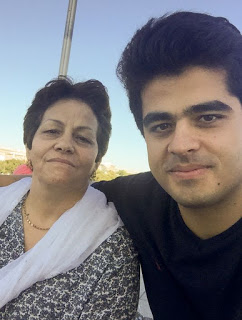Louisville doctor has possible cure for rare brain disease of Iranian woman, who gets visa after CJ story

UPDATE, Aug. 13: “U.S. officials in Armenia granted Marzieh Taheri, 61, the exemption on Monday, just hours after her son sent them links to the Courier Journal‘s initial article about her plight and subsequent coverage by other media,” the CJ reports.
A Louisville doctor has found what may be the first treatment to repair a rare, debilitating brain condition that can eventually lead to death, and has said he would treat a 61-year-old woman from rural Iran who needs it, but she’s from a country that’s on the U.S. travel restriction list and her visa application is jumping through hoops, Caitlin McGlade reports for the Louisville Courier Journal.
Marzieh Teheri suffers from a condition called radiation necrosis, which developed after she received treatment for a tumor on her ear about three years ago. McGlade reports that the tumor is gone, but because of a condition that affects 10 percent of patients who get radiation therapy on their heads, brain tissue has died, which has “distorted her brain.” Until recently, there has been no hope of a cure.
But that changed after Dr. Shervin Dashti, a neurosurgeon at Norton Healthcare, recently found what may be the first treatment to repair the brain indefinitely without any side effects, McGlade reports.
Dashti told McGlade that it’s like half of Taheri’s brain is “on fire.” He has offered to treat her at the Norton Neuroscience Institute, but won’t be able to until the U.S. government approves her visa.
The Trump administration set travel restrictions on people from Iran, North Korea, Venezuela, Libya, Syria, Somalia and Yemen that were upheld in June by the U.S. Supreme Court. The administration says the restrictions are needed to be able to properly vet people from these countries trying to enter the U.S.
McGlade reports that on a case-by-case basis, “People traveling to the U.S. from these countries may get waivers if they can show that denying the visa application would cause them ‘undue hardship,’ that they are not a threat to the United States, and that their visit would be in the U.S. national interest, according to a September 2017 White House proclamation.”
The State Department “asked Taheri to list every country she traveled to in the past 15 years, detailing where she stayed, specific locations visited, how she paid for it and length of visit.The office also asked for previous passport numbers; names and birth dates of all immediate relatives; a list of her addresses for the past 15 years; all phone numbers, email addresses, social media accounts, including messaging apps; and her job history. Her daughters compiled and sent a mountain of documents.”
Taheri told McGlade that she is optimistic she’ll get a waiver, since the proclamation cites urgent medical care as grounds for eligibility. However, McGlade reports that critics call the restrictions discriminatory because most of the countries on the list are Muslim-majority, and Trump said he wanted to ban Muslims during his campaign.
Dissenting Supreme Court Justice Stephen Breyer has also questioned the waiver program’s legitimacy, “citing the small number of waivers granted, lack of transparency and a sworn affidavit from a former consular officer who called the process “window dressing,”” McGlade reports.
A lawsuit has also been filed this year by dozens of people impacted by the ban asserting that the “government is denying or stalling virtually all waiver grants and hasn’t given consular officials discretion to grant them,” McGlade writes.
McGlade writes that the agencies have yet to file formal responses, but a State Department website disputes that claim. It notes that 1,246 visa applicants have been cleared for waivers as of July 31, 2018.
McGlade reports that the State Department won’t say how many of the current visa applicants are from the affected countries, but a June letter to Sen. Chris Van Hollen, D-Maryland, said they had approved waivers for just 2 percent of applicants from Muslim-majority countries in the ban.
“Out of 27,129 applicants who could possibly get a waiver, only 579 had been cleared as of April 30,” she reports.
Taheri applied for her visa in June. Dashti told McGlade that everyday Taheri gets weaker, and that she is “circling the drain.”
“It is agony to place my faith in a process that I know might be fraudulent, but I have no choice,” wrote her son, Mehran Jafari, who now lives in Georgia. “My mother’s life could be saved by 30 minutes of surgery, and I must do everything in my power to get her to Louisville.”
He added, “I don’t know how my 60-year-old mom who was in the United States three years ago can pose a national security threat. If someone like my mom can pose a threat . . . how safe do Americans feel now? If a 60-year-old kind-of disabled woman can jeopardize your safety . . . this is just not America.”